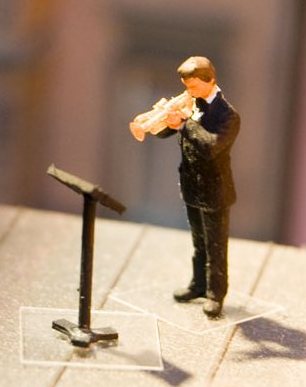 "Sesquies": tiny fanfares for a big country.
"Sesquies": tiny fanfares for a big country. Ravel’s Pavane pour une enfante défunt isn’t very long, clocking in at about six-and-a-half minutes. But I’m looking for pieces that are even shorter than that.
Stravinsky wrote some orchestral miniatures: his Circus Polka is about four minutes, and his Fireworks is even shorter, at about three-and-a-half minutes. And, of course, Webern wrote numerous miniatures for orchestra – although he usually conjoined them into multi-movement suites. As well, there’s Copland’s Fanfare for the Common Man – although, strictly speaking, it’s not quite an orchestral work.
I can’t, either. Yet for some reason, the Toronto Symphony Orchestra, working in collaboration with a clutch of other Canadian orchestras, thinks there’s something to be gained by creating a body of such tiny orchestral pieces. They’re called “Sesquies” – in reference to Canada’s sesquicentennial celebrations in the year 2017 – and the TSO and its partners have commissioned 40 of them from Canadian composers. Each Sesquie will be performed by the TSO in Toronto and by a regional Canadian orchestra in some other city.
I’ve already heard three Sesquies, played by the TSO – and they’ve been trivial and ephemeral, none of them amounting to a hill of beans. And I say this not so much as a criticism of the composers who wrote them, but as a criticism of the restrictions they had to work under. Two minutes is shorter than the average pop song! I don’t think there’s any way to compact a complete, musically satisfying statement for a large orchestra into the time it takes to make toast.
So how did such a ridiculous idea sprout legs and come to stalk the land? I can’t help thinking it’s a reductio ad absurdum example of the Canadian tendency to make sure everyone gets a prize. Commissioning 40 composers, and creating a series of performances from coast to coast looks, at first glance, like a broad, inclusive and generous gesture. The only catch is that the “lucky” composers commissioned to write the Sesquies have been asked to waste their time and talents.
This Sesquie nonsense reminds me of an incident, some decades ago, when a Canadian composer decided to challenge the idea that he should work within a constricted time-frame. And, curiously, the story also involves the Toronto Symphony Orchestra.
I’m referring, of course, to R. Murray Schafer’s No Longer than Ten [10] Minutes, written for the TSO in 1972. Feeling that he had been asked to write a “pièce de garage” (i.e. a short work to be played when some audience members were still parking their cars) he created a piece that could hypothetically continue indefinitely, because audience applause triggered a reprise of the work’s climax. In his biography, My Life on Earth and Elsewhere, Schafer recounts the premiere:
“As ten minutes approached, the huge crescendo of sound grew, and [conductor] Victor [Feldbrill] managed to get it building up effectively. When he turned to leave, the patrons reacted predictably by applauding, and the huge wall of sound began again… From my seat in the first balcony, I could see everything. I stood up, bowed, and began to bravo vociferously… The percussion rose to another climax… The audience had by now quite realized the cybernated situation and were beginning to join in the fun too. More crescendi from the orchestra. More applause. The offstage door opened a crack and I could see someone through the crack gesticulating desperately towards the percussionists, trying to get them to stop. It was the orchestra manager.”
Times have changed since the 1970s. Today, many of Canada’s composers take a much more “professional” approach to their craft, and the spirit of rebellion is not in the air. So I don’t expect that any of the 40 Sesquie composers will do anything as outrageous as Schafer did.
However, if any of the composers who have not yet completed their Sesquies are reading these words, I encourage them to take the two-minute time restriction with a grain of salt. Write to a full five minutes, or more, if you want to, and create something with some substance to it that might even be performed again in future years. Then present your score for performance – in effect, daring the TSO and the partner orchestra not to play it.
Composers, it’s time to face a cold, hard truth: any orchestra that can spare only two minutes of its precious time for your music has no real interest in you. If you want to know where you stand, demand a little respect.
© Colin Eatock 2017
 RSS Feed
RSS Feed

